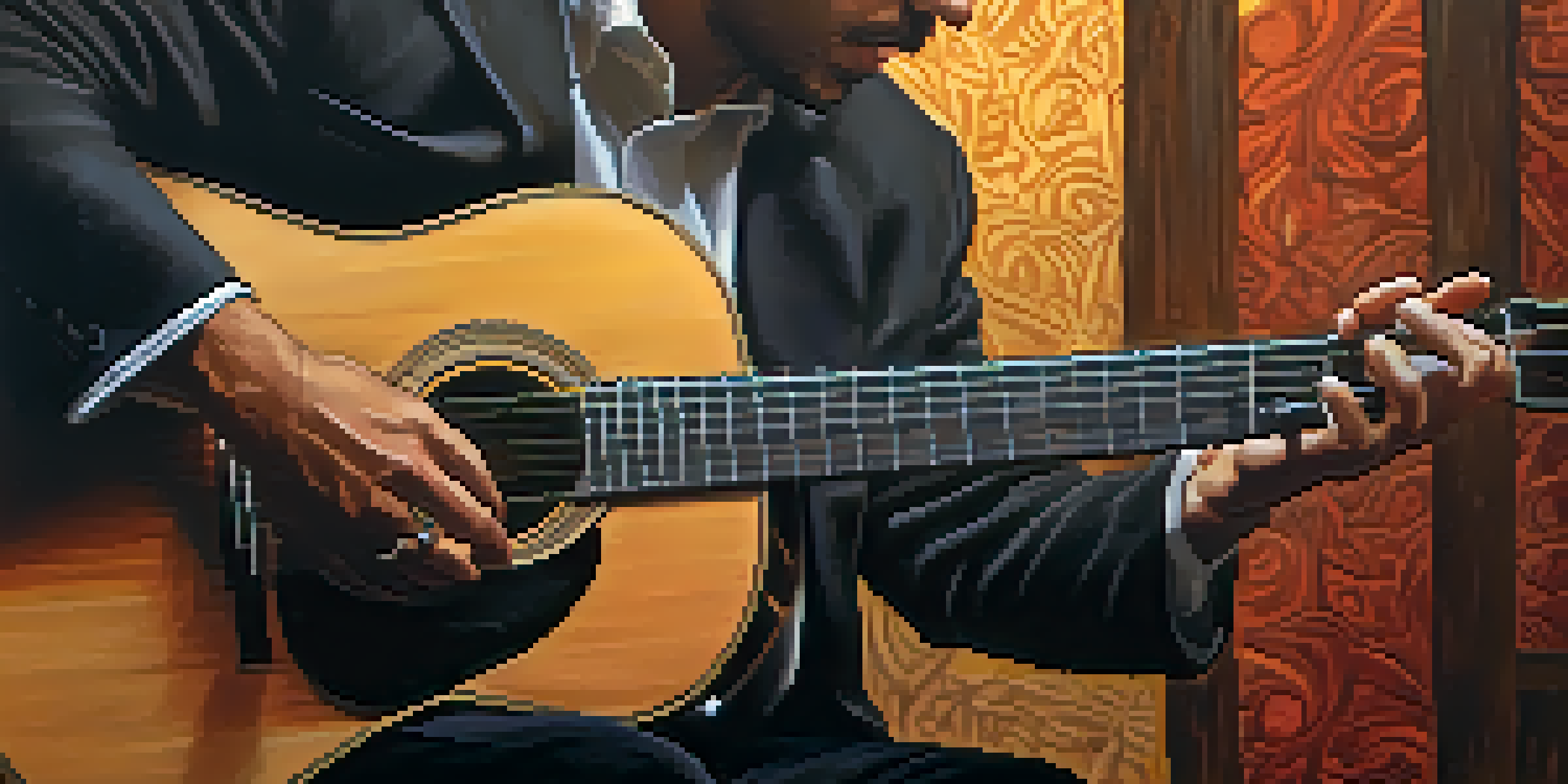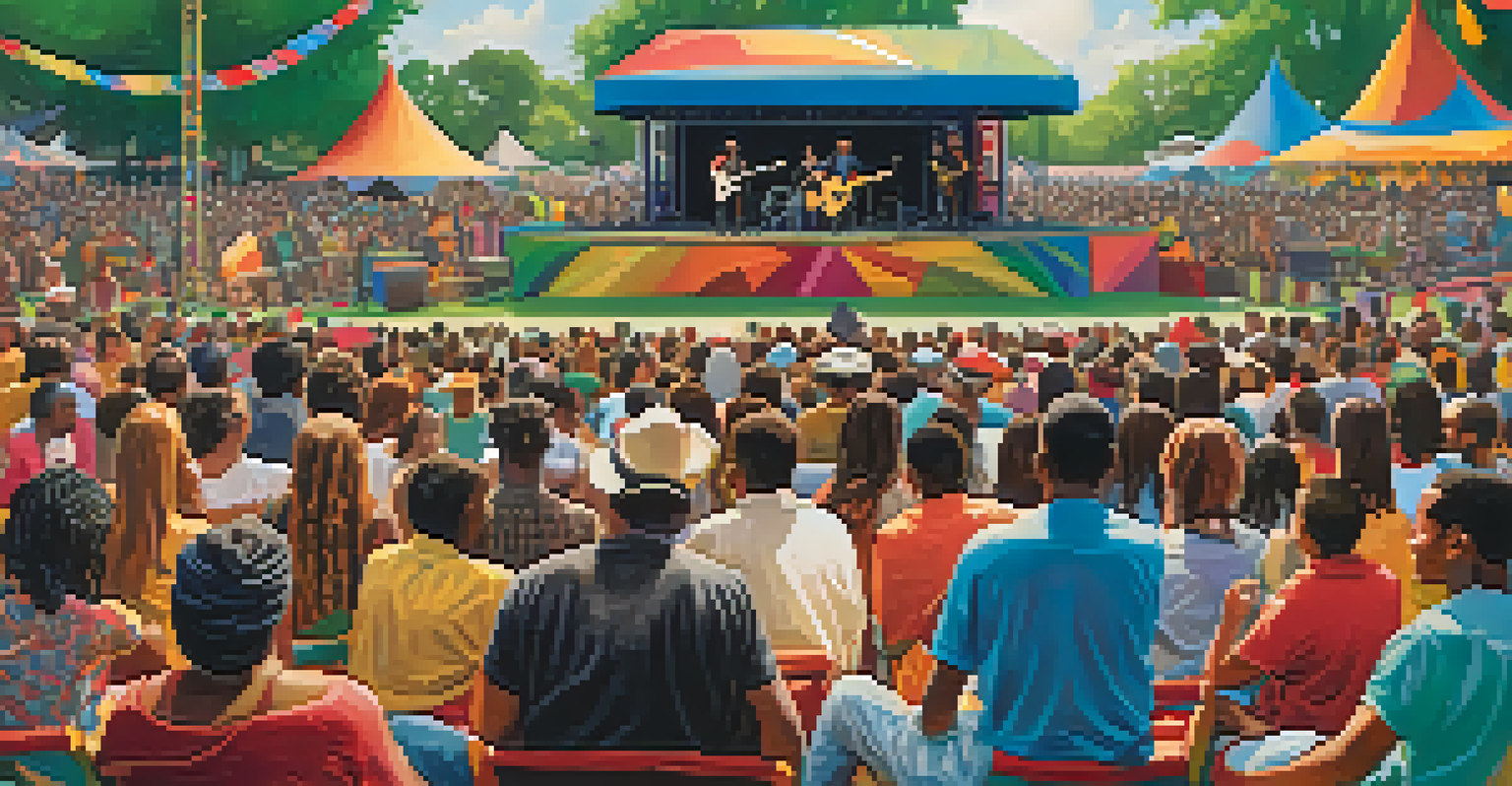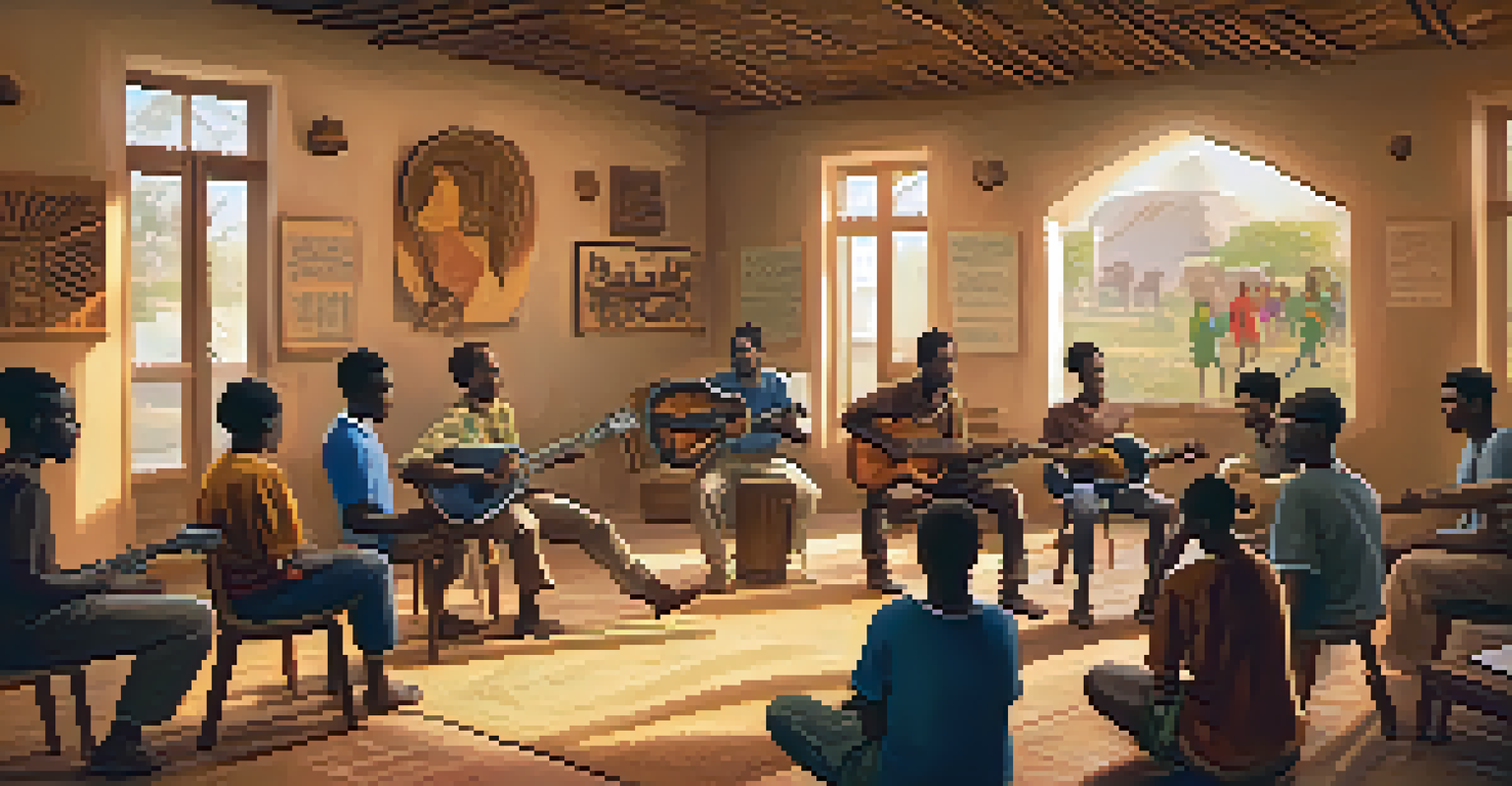Cultural Identity in Guitar Techniques and Styles

The Role of Cultural Identity in Music Expression
Cultural identity plays a significant role in how music is created and perceived. For guitarists, this identity often influences their playing style, choice of techniques, and the genres they embrace. When musicians incorporate elements from their cultural background, they create a unique sound that resonates with their personal experiences and heritage.
Music can change the world because it can change people.
For instance, a guitarist from a Latin American background may naturally incorporate rhythms and techniques from flamenco or bossa nova. This not only enriches their playing but also serves as a bridge connecting listeners to different cultural narratives. The guitar becomes a vessel for storytelling, reflecting the nuances of the artist's identity.
Moreover, as globalization continues to shape music, the blending of techniques from various cultures creates exciting fusions. Guitarists can explore and combine styles, resulting in innovative sounds that honor their roots while appealing to a broader audience.
Traditional Techniques: A Window into Heritage
Traditional guitar techniques often serve as a direct reflection of a culture's history and values. For example, the intricate fingerpicking styles found in American folk music reveal a deep connection to storytelling and community. These techniques are passed down through generations, making each note a testament to cultural preservation.

In contrast, the use of slide guitar in blues music showcases the emotional depth and struggles of African American communities. The technique itself, with its smooth glides and bends, embodies the pain and resilience of its origins. Thus, traditional techniques not only define the sound but also encapsulate the emotional landscape of a culture.
Cultural Identity Shapes Music
Musicians incorporate elements from their cultural backgrounds, creating unique sounds that reflect their heritage.
As guitarists delve into these traditional methods, they contribute to a larger narrative about cultural identity. Each strum or pluck serves as a reminder of where they come from, making their music a powerful expression of heritage.
Modern Innovations: Blending Cultures in Guitar Music
Modern guitarists are increasingly blending techniques from various cultures, creating a rich tapestry of sound that reflects our interconnected world. Genres like world music and fusion often showcase this innovative spirit, where musicians experiment with everything from jazz to Indian classical music. This blending not only highlights the versatility of the guitar but also celebrates cultural diversity.
The beauty of music is that it connects people, transcending borders and cultural barriers.
For instance, the incorporation of Indian ragas into rock music can result in a compelling mix that challenges the boundaries of traditional genres. Guitarists who embrace this fusion often find new ways to express their identity while paying homage to their influences. It's a beautiful reminder of how music can transcend geographical barriers.
Furthermore, this innovation fosters collaboration among artists from different backgrounds, leading to a vibrant exchange of ideas. Each collaboration becomes a celebration of cultural identity, revealing how diverse influences can coexist and thrive in the modern music landscape.
The Impact of Globalization on Guitar Styles
Globalization has significantly impacted guitar styles, making diverse techniques more accessible than ever. With the rise of the internet and social media, musicians can share their unique styles with a global audience. This exposure means that guitarists can learn from each other, regardless of their location, leading to a richer understanding of different cultural identities.
As a result, we see a new generation of guitarists who are not confined by traditional boundaries. They blend techniques from various cultures, creating a sound that is uniquely their own. This evolution in guitar playing not only reflects personal identity but also the dynamic nature of cultural exchange in our increasingly connected world.
Globalization Blends Guitar Styles
The internet has made diverse guitar techniques accessible, allowing artists to blend styles and create innovative sounds.
However, this globalization also raises questions about cultural appropriation. It's essential for musicians to navigate these waters respectfully, recognizing the origins of the techniques they adopt and ensuring they honor the cultures they represent.
Guitar Styles and Their Cultural Origins
Every guitar style has its roots in cultural contexts that shape its sound and technique. For example, the percussive strumming of reggae guitar is deeply connected to the rhythms and spirit of Jamaican culture. Similarly, the use of alternate tunings in Celtic music reflects the melodic traditions of the British Isles.
Understanding these origins enriches a guitarist's appreciation for their instrument and the music they play. By studying the cultural background of different styles, musicians can deepen their connection to the music and gain insights into the stories behind the sounds. Each style becomes a thread in the larger tapestry of global music.
Moreover, recognizing these cultural origins fosters a sense of respect and responsibility among guitarists. It encourages them to approach their craft with a heightened awareness of the traditions they are engaging with, leading to a more meaningful musical practice.
Learning from Cultural Influences: A Personal Journey
For many guitarists, exploring cultural influences is a personal journey that shapes their musical growth. Whether it's learning flamenco techniques from a Spanish mentor or exploring African rhythms, these experiences broaden their musical horizons. Each new influence adds depth to their playing, allowing them to express their identity in more nuanced ways.
Many musicians find that immersing themselves in different cultural styles not only enhances their technical skills but also deepens their emotional connection to music. This exploration can lead to profound realizations about their own heritage and the role it plays in their artistry. It becomes a process of self-discovery through sound.
Celebrating Diversity in Music
The guitar community thrives on diverse influences, fostering collaboration and representation among musicians from various cultures.
Ultimately, this personal journey underscores the idea that music is a universal language. By learning from various cultural influences, guitarists can create a dialogue that transcends borders, fostering a sense of unity and understanding.
Celebrating Diversity in the Guitar Community
The guitar community is a vibrant mosaic of diverse influences and backgrounds, making it a rich space for cultural expression. Festivals, online platforms, and local gatherings often showcase this diversity, bringing together musicians from various cultures to share their unique styles. This celebration of diversity not only enriches the music but also strengthens community bonds.
Events that highlight different cultural techniques encourage collaboration and learning. For instance, a workshop that focuses on Brazilian guitar techniques might attract players from different backgrounds, fostering an environment of creativity and exchange. Such interactions can spark new ideas and inspire musicians to explore unfamiliar styles.

Moreover, this celebration of diversity in the guitar community reinforces the importance of representation. As more musicians from varied backgrounds gain recognition, it paves the way for future generations to embrace their cultural identity through music, ensuring that the guitar remains a powerful tool for storytelling and connection.